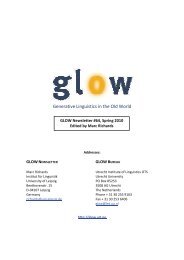Practical Information - Generative Linguistics in the Old World
Practical Information - Generative Linguistics in the Old World
Practical Information - Generative Linguistics in the Old World
Create successful ePaper yourself
Turn your PDF publications into a flip-book with our unique Google optimized e-Paper software.
Visser’s Generalization and <strong>the</strong> c-command condition on ControlJacek Witkoś & Sylwiusz śychlińskiAdam Mickiewicz University, Poznań, PolandThe aim of this presentation is to address <strong>the</strong> issue of Visser’s Generalization (henceforthVG), hold<strong>in</strong>g that subject control (hence SC) verbs are <strong>in</strong>compatible with <strong>the</strong> passive, andpropose a solution based on a comb<strong>in</strong>ation of <strong>the</strong> passive seen as smuggl<strong>in</strong>g and ObligatoryControl seen as A-movement (Hornste<strong>in</strong> 2001, Hornste<strong>in</strong> & Pol<strong>in</strong>sky 2010). We will beargu<strong>in</strong>g that Control holds under c-command:(1) In <strong>the</strong> LF representation of Obligatory Control <strong>the</strong> controller must c-command its trace<strong>in</strong> <strong>the</strong> subject position (PRO).The VG effect arises as <strong>the</strong> condition <strong>in</strong> (1) is not respected <strong>in</strong> <strong>the</strong> passive of SC verbs.The nature of VG: <strong>the</strong> generalization, put forward <strong>in</strong> Visser (1973), holds that structures ofsubject-oriented predication resist <strong>the</strong> passive transformation, specifically, SC verbs are notcompatible with <strong>the</strong> passive transformation (cf. 2b). Interest<strong>in</strong>gly, <strong>the</strong> same matrix controlpredicates shift<strong>in</strong>g to OC allow for <strong>the</strong> passive (cf. 2d). Similarly, OC verbs shifted to subjectcontrol mode disallow <strong>the</strong> passive (cf. 3d):(2) a. He promised me [PRO to open my gifts for me]. (SC)b. *I was promised to open my gifts for me. (SC + passive)c. He promised me to be allowed to [PRO to open my gifts]. (SC shifts to OC)d. I was promised to be allowed to open my gifts. (OC + passive)(3) a. He asked me to open my gifts. (OC)b. I was asked to open my gifts. (OC + passive)c. He asked me to be allowed to open my gifts for me. (OC shifts to SC)d. *I was asked to be allowed to open my gifts for me. (SC + passive)Van Urk (2011) narrows <strong>the</strong> scope of <strong>the</strong> VG effect fur<strong>the</strong>r and observes that it applies onlywhen <strong>the</strong> matrix object is promoted to [spec,T], while it does not apply <strong>in</strong> <strong>the</strong> (impersonal)passive construction without promotion:(4) Er werd mij beloofd om me op de hoogte te houden.<strong>the</strong>re was me-DAT promise-PAST COMP me-DAT on <strong>the</strong> height to keep-INF‘It was promised to me to keep me <strong>in</strong>formed.’Thus <strong>the</strong> nature of <strong>the</strong> VG effect does not consist <strong>in</strong> <strong>the</strong> <strong>in</strong>compatibility of <strong>the</strong> passive andSubject Control <strong>in</strong>terpretation but ra<strong>the</strong>r <strong>the</strong> clash between Subject Control <strong>in</strong>terpretation and<strong>the</strong> promotion of <strong>the</strong> object. In solv<strong>in</strong>g <strong>the</strong> VG puzzle we will assume <strong>the</strong> smuggl<strong>in</strong>g <strong>the</strong>ory of<strong>the</strong> passive <strong>in</strong> Coll<strong>in</strong>s (2005a), whose key element is (5) below:(5) a. with<strong>in</strong> an articulated projection of <strong>the</strong> passive clause <strong>the</strong> constituent <strong>in</strong>clud<strong>in</strong>g<strong>the</strong> passive participle, <strong>the</strong> object DP and (possibly) <strong>the</strong> rema<strong>in</strong>der of <strong>the</strong>complement doma<strong>in</strong> of <strong>the</strong> verb ([ PartP Part [ VP V DPo]]) is moved to <strong>the</strong>position of [spec,Voice] around <strong>the</strong> implicit Agent <strong>in</strong> [spec,v]; next <strong>the</strong> DPobject is moved to [spec,T], <strong>in</strong> l<strong>in</strong>e with MLC:b. [ VoiceP [ PartP Part [ VP V DPo]] Voice-by [ vP DP Agent v [ PartP …t…]]]]





